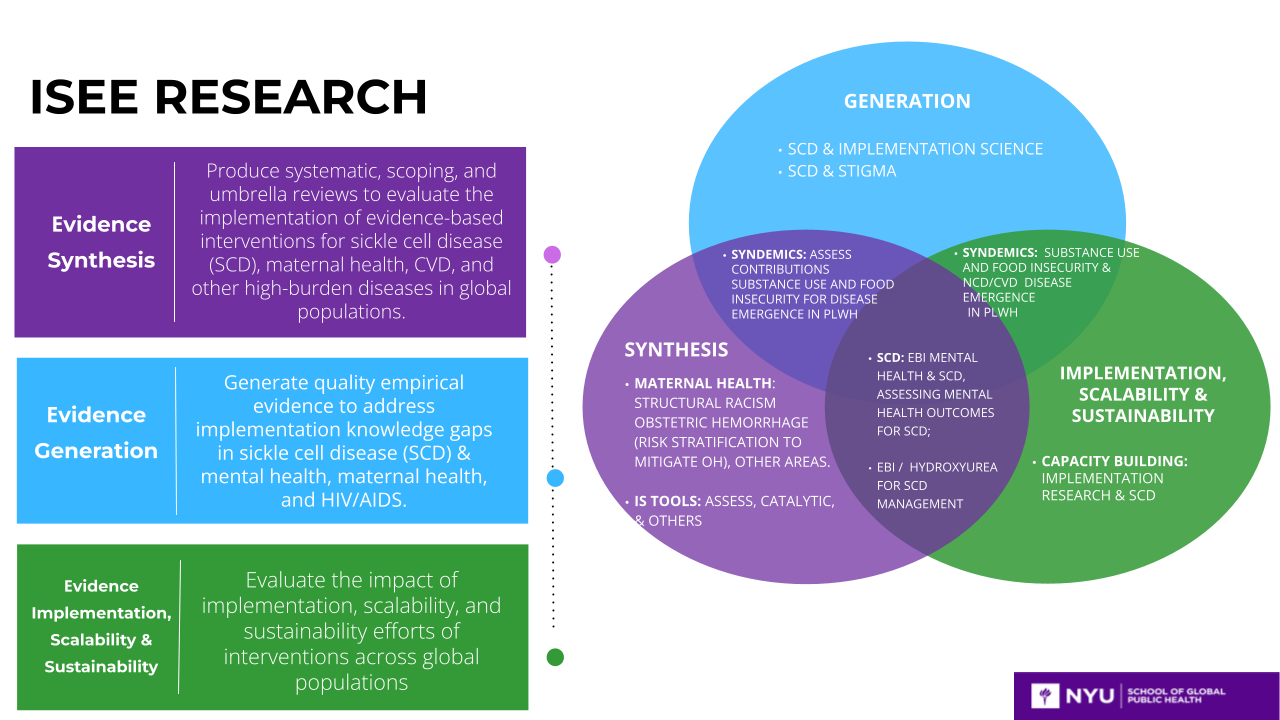
Evidence Synthesis
Implementation Research Handbook
The goal of this project is to document and externalize best practices for reviews, including scoping, systematic, and umbrella reviews in implementation research, in a codified handbook.
Evaluating Implementation Research
The goal of this project is to investigate the quality of implementation research and to make recommendations for conducting appropriate research.
Updating Implementation Outcomes
The goal of this project is to identify tools and assessments for all implementation outcomes and to evaluate new outcomes that may need to be incorporated into the implementation science field.
Mental Health and HIV/AIDS: A Scoping Review
This project explores the association of mental health and non-communicable diseases in people living with HIV/AIDS in Africa. Synthesizing evidence from 17 studies to examine how HIV/AIDS, mental health conditions—especially depression—and non-communicable diseases such as hypertension and diabetes cluster and interact in sub-Saharan Africa. The review highlights that women and older adults are disproportionately affected and that stigma, poverty, resource constraints, and fragmented health services intensify these overlapping burdens. Many NCDs and mental health conditions remain undiagnosed or poorly managed among people living with HIV, undermining treatment adherence and quality of life. We call for integrated, person-centered care models that combine HIV, NCD, and mental health screening and services; targeted stigma-reduction; and health-system strengthening through workforce training, reliable medicines, and better data. Advancing this integrated approach is essential to reduce disparities, improve outcomes, and accelerate progress toward the Sustainable Development Goals
Interventions for CVD: An Umbrella Review
This project is an umbrella review of systematic reviews and meta-analysis to examine quality and reporting of scalability of interventions for the top 3 global burden of CVD (rheumatic heart disease, ischemic heart disease, and stroke).
Evidence-Based Intervention for Global SCD populations: A Scoping Review
This project explores evidence-based, non-pharmacological interventions that address mental health issues for SCD populations globally.
BEAT-SCD: A Systematic Review
This project explores music-based, health communication interventions for SCD populations.
Obstetric Hemorrhage Prevention
This project aims to identify and synthesize quantitative and qualitative literature on obstetric hemorrhage prevention based implementation outcomes
Evidence Generation
Gaslighting
Assessing the practice gaslighting and the impact on women within the existing medical and psychosocial literature
SPARCS Project
Analysis of the Sickle Cell Anemia (SCA) crisis data available within the Statewide Planning and Research Cooperative System (SPARCS) in New York State to examine health outcomes regional disparities in sickle cell disease (SCD) hospitalizations across New York State (NYS) from 2009 to 2022. The study examines differences in disease severity, mortality risk, healthcare costs, and hospital resource utilization across various health service areas in NYS.
All of US
This project examines the relationship between Sickle Cell Disease (SCD), social vulnerability, and health outcomes, including discrimination in medical settings and mortality, using data from the All of Us research program and the Social Vulnerability Index (SVI). By analyzing healthcare experiences and survival patterns, this study aims to highlight health disparities in SCD and the impact of social factors on patient outcomes.
Nano/Microplastics and Women's Health
This projects asseses the impact of nano/microplastics on women’s health
Evidence Implementation, Scalability, and Sustainability
ACEELERATE Implementation trial in Nigeria for SCD management: mAnaging siCkle CELl disEase through incReased AdopTion of hydroxyurEa in Nigeria (ACCELERATE)
An implementation trial with an embedded clinical trial using task-shifting to improve the uptake of hydroxyurea (HU) prescription among providers.
Primary outcome: Adoption of HU over a 2-year period.
Qualitative analysis of SCD providers’ and researchers’ perceptions on the adoption of a task-sharing mental health intervention for SCD patients in LMICs.
A commentary exploring the role of implementation science in the uptake and scalability of EBI for SCD management.
Cancer Screenings
Assessing the value of integrated cancer screening interventions for breast, cervical, ovarian, and uterine cancer, targeting women of reproductive age in LMICS